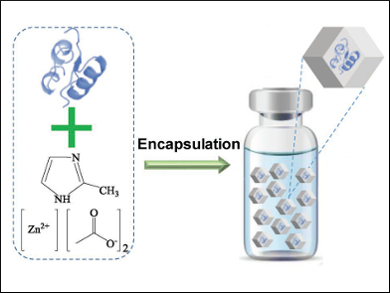Protein therapeutics such as insulin can be damaged by heat or other influences during storage and, thus, lose their bioactivity. They need constant refrigeration to remain usable, which can be challenging in resource-limited regions of the world.
Samuel Achilefu, Srikanth Singamaneni, Washington University in St. Louis, MO, USA, and colleagues have found that a metal–organic framework (MOF) can protect drugs such as insulin against harsh conditions without a need for refrigeration. The team encapsulated insulin in the zeolitic imidazolate framework‐8 (ZIF‐8) by mixing an insulin solution with aqueous solutions of 2‐methylimidazole and zinc acetate, the MOF’s building blocks (pictured). The insulin proteins serve as nucleation sites and are encapsulated by ZIF-8 crystals.
The insulin can easily be released before administration by adding ethylenediaminetetraacetic acid (EDTA), which binds the zinc ions and dissolves the MOF. The EDTA-dissolved MOF has a low cytotoxicity. The residue can also be removed by a simple purification step before the insulin administration.
The team tested the protective effect of the MOF by exposing the encapsulated insulin to elevated temperatures (25, 40, or 60 °C), mechanical agitation, or organic solvents (e.g., ethyl acetate). Then the MOF was dissolved to release the insulin and the solution was administered to diabetic mice. The researchers found that the MOF-protected insulin has a comparable bioactivity to refrigeration-stored insulin. Pure insulin stored under the same harsh conditions, in contrast, lost much of its bioactivity.
- Metal–Organic Framework Encapsulation Preserves the Bioactivity of Protein Therapeutics,Congzhou Wang, Gail Sudlow, Zheyu Wang, Sisi Cao, Qisheng Jiang, Alicia Neiner, Jeremiah J. Morrissey, Evan D. Kharasch, Samuel Achilefu, Srikanth Singamaneni,
Adv. Healthcare Mater. 2018.
https://doi.org/10.1002/adhm.201800950




